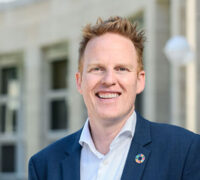Is it time to reinvent capitalism? For Peter Bakker, President and CEO at the World Business Council for Sustainable Development (WBCSD), the answer is a resounding “yes”, and he called for new ways of doing business beyond pure shareholder value creation.
“Yes, we need to continue to perform financially well and therefore shareholder capitalism will remain a part of the mix,” says Bakker, in an exclusive dialogue with David Bach, Professor Strategy and Dean of Innovation at IMD. However, Bakker argues for a new type of leadership, in which individuals show the courage to build regenerative business models and ensure a just transition that leaves no one behind: “We need to understand and be able to manage and improve the environmental and the social impacts of our business…in a truly integrated style of management.”
Bakker spotlights three momentous worldwide challenges: the climate emergency, nature loss, and mounting inequality. The COVID-19 pandemic proved that these challenges are interconnected, and that our economic systems are ill-prepared for massive shocks — like the shortage of semiconductors rippling through global supply chains.
WBCSD is the premier global, CEO-led community of over 200 of the world’s leading sustainable businesses working collectively to accelerate the system transformations needed for a net zero, nature positive, and more equitable future. Bakker, a Dutchman who has for a decade led WBCSD based in Geneva, Switzerland, says business leaders must perform three mindset shifts:
- moving capitalism towards a more inclusive economic model;
- building long-term resilience;
- taking a regenerative approach to business beyond simply reducing a firm’s ecological footprint.
Regenerative business models
He says that “in order to restore nature’s capacity to support us all, we need to have regenerative business models,” approaches that make the restoration of the health of individuals, communities and the planet part of corporate purpose. It is a departure from current models based on environmental or human resource exploitation and waste, contributing to climate change and insecure livelihoods.
Another central leadership attribute needed to confront these challenges is courage. “We’re going to have to fundamentally challenge everything we do,” says Bakker, citing the electric vehicle revolution as an example. Several carmakers are now doing what was previously unthinkable: phasing out the internal combustion engine altogether, despite its striking commercial success.
“This is going to be the decade of transformation,” he says. “That’s where courage will be needed,” adds Bakker, since it’s not easy “telling your investors: ‘Hey, my business model today is actually broken.” The transition is the challenge: “’My business model a decade out’ is pretty clear. But what’s going to happen to the cash flow in-between? That’s where courage comes in.”
Stranded assets
Bakker was formerly CFO and then CEO of TNT NV, the global transport and logistics company. In his view, the risk for organizations which do not undertake drastic business model transitions is that some their key assets become stranded — unable to earn an economic return. In recent years, stranded assets, such as oil and coal reserves, have resulted from the policy- and societal responses to climate change and investors are now pricing the diminished value in.
Customers and employees have for some time pressured companies to become part of the solution. But the emergence of investors as another pivotal stakeholder pushing for change has created a new sense of urgency. Bakker says: “What we’re now beginning to see is that capital markets are beginning to price in the risks…That is really making this a boardroom topic of the highest priority.”
Another growing risk factor is litigation. “Very new legal threats are emerging,” he says. “Companies have lost court cases, forcing them to have more ambitious [carbon reduction] plans. This is a trend that is beginning to pop up. So it’s not just capital markets [driving change], it’s a completely changing landscape.”
In a landmark legal case last spring, for instance, Royal Dutch Shell, now Shell plc, was ordered by a Dutch court to increase its emissions cuts, potentially setting a global precedent for corporations with big carbon footprints.
YouTube


 Podcast available
Podcast available